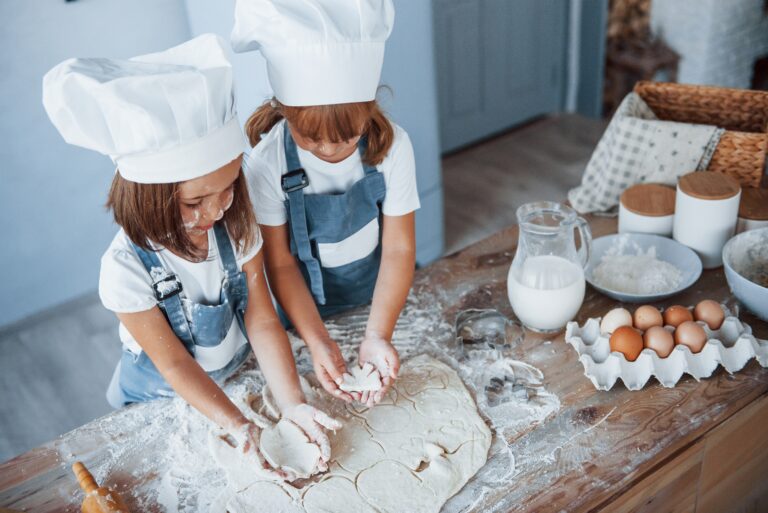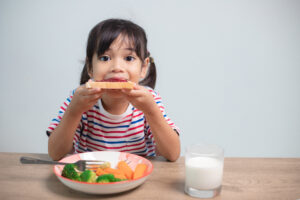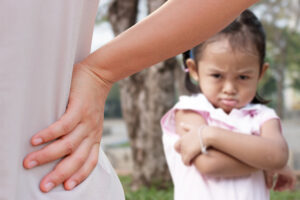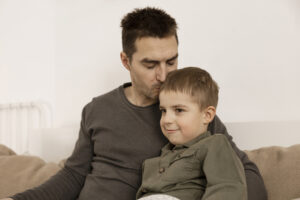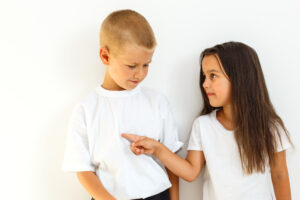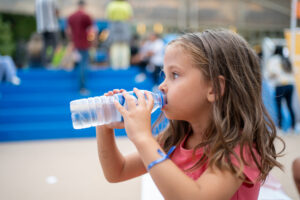Cooking is an essential life skill that every child should learn. It not only teaches them about nutrition and meal preparation, but it also provides an opportunity for children to develop a range of skills that will be useful throughout their lives.
When children cook, they are exposed to a hands-on learning experience that can help them grow mentally, emotionally, and socially.
Additionally, cooking together can create lasting memories and foster a stronger family bond.
In this article, I will delve into the numerous ways that cooking can benefit your child’s development.
How cooking helps children learn: Cognitive development
One of the primary ways that cooking helps children learn is by promoting cognitive development. Cognitive development refers to the growth of a child’s ability to think, reason, and problem-solve.
As children follow recipes, measure ingredients, and make decisions about what to cook, they are engaging their cognitive skills.
When a child follows a recipe, they practice reading comprehension and sequencing. They must understand the order of the steps and follow instructions to complete the dish successfully.
This process helps to develop their ability to think logically and follow a process from start to finish.
Measuring ingredients is another cognitive skill that children practice while cooking. They must understand the different units of measurement and how to accurately measure each ingredient.
This activity helps children develop their understanding of numbers, measurements, and basic math concepts.
Lastly, making decisions about what to cook requires children to think about their preferences, consider what ingredients they have available, and plan a meal.
This process helps to develop their decision-making skills and teaches them how to plan and organize a task.
Developing motor skills through cooking activities
In addition to cognitive development, cooking also helps children develop their motor skills.
Motor skills refer to the ability to control the muscles in our bodies and are typically divided into two categories: gross motor skills and fine motor skills.
Gross motor skills involve the larger muscles in the body and include actions like stirring, kneading dough, and rolling out pastry.
As children engage in these activities, they are developing their muscle strength and coordination.
Fine motor skills are the smaller muscle movements that control actions like grasping, holding, and manipulating objects.
Cooking activities like cutting, measuring, and pouring require children to utilize their fine motor skills.
These activities help to develop a child’s hand-eye coordination, dexterity, and precision.
By practicing both gross and fine motor skills through cooking, children develop the physical abilities they need to navigate the world around them effectively.
The role of cooking in fostering creativity and problem-solving skills
Cooking is an inherently creative process, and involving children in this activity can help to foster their creativity and problem-solving skills.
When children experiment with different flavors, textures, and ingredients, they are learning to express themselves creatively and think outside the box.
Problem-solving skills are also developed through the process of cooking. As children encounter challenges in the kitchen, such as a dish not turning out as expected, they must think critically about what went wrong and how to fix it.
This process teaches children to analyze situations and come up with solutions, a skill that will be invaluable in their personal and professional lives.
Cooking as a tool for teaching math and science concepts
Cooking provides an excellent opportunity for children to explore math and science concepts in a hands-on, practical way.
As children measure ingredients, they are practicing their understanding of fractions, ratios, and basic arithmetic. This helps to reinforce their math skills and makes abstract concepts more concrete.
Science concepts can also be explored through cooking. When children observe the changes that occur as they mix ingredients and apply heat, they are witnessing chemical reactions and physical changes firsthand.
This helps to build their understanding of basic scientific principles, such as the states of matter, chemical reactions, and the effect of temperature on various substances.
By integrating math and science concepts into cooking activities, children are more likely to retain the information and develop a deeper understanding of these subjects.
Building social skills and teamwork in the kitchen
Cooking can be a social activity that helps children develop their interpersonal skills and learn about teamwork.
When children cook with their parents or siblings, they must communicate effectively, share responsibilities, and work together to achieve a common goal.
In addition to fostering teamwork and collaboration, cooking together also provides an opportunity for children to learn about different cultures and cuisines. By trying new recipes and ingredients, children are exposed to new flavors and learn about the cultural significance of various dishes.
This exposure can help to develop their appreciation for diversity and encourage open-mindedness.
The impact of cooking on a child’s self-esteem and confidence
As children learn to cook and develop their skills in the kitchen, they often experience a boost in their self-esteem and confidence.
Successfully completing a recipe and creating a delicious dish provides a sense of accomplishment and pride.
This positive reinforcement helps children to believe in their abilities and encourages them to continue learning and growing.
Furthermore, as children become more skilled in the kitchen, they can begin to take on more responsibility and independence.
This increased autonomy helps to foster a sense of self-reliance and confidence in their abilities to care for themselves and others.
How to involve children in meal planning and preparation
Involving children in meal planning and preparation can be a fun and educational experience for the whole family.
Here are some tips for getting your child involved in the kitchen:
- Start by discussing meal ideas and preferences with your child. Ask them what they would like to eat and what ingredients they might like to try.
- Encourage your child to help with grocery shopping. This can be an excellent opportunity to discuss the importance of reading labels, choosing fresh produce, and making healthy choices.
- Assign age-appropriate tasks to your child in the kitchen. For younger children, this might include washing fruits and vegetables, stirring ingredients, or setting the table. Older children can help with measuring, chopping, and cooking tasks.
Age-appropriate cooking tasks for children
When involving children in cooking activities, it’s essential to assign tasks that are appropriate for their age and skill level.
Here are some age-appropriate cooking tasks for children:
- Ages 2-4: Stirring ingredients, washing fruits and vegetables, tearing lettuce, and using cookie cutters.
- Ages 5-7: Measuring ingredients, cracking eggs, using a vegetable peeler, and spreading butter or condiments.
- Ages 8-10: Chopping and slicing with supervision, grating cheese, using a can opener, and preparing simple recipes.
- Ages 11 and up: Using the stove and oven with supervision, using a knife independently, and preparing more complex recipes.
Remember to always supervise children in the kitchen and teach them about kitchen safety, such as proper knife handling, using oven mitts, and avoiding hot surfaces.
Conclusion: Embracing the learning opportunities in the kitchen
In conclusion, the kitchen is a treasure trove of learning opportunities for children. How cooking helps children learn encompasses a wide range of skills, from cognitive development to motor skills, creativity, teamwork, and more.
By involving your child in meal planning and preparation, you can help them unlock their potential and set them up for success in all aspects of their lives. So, grab your aprons and get cooking with your little ones today!

